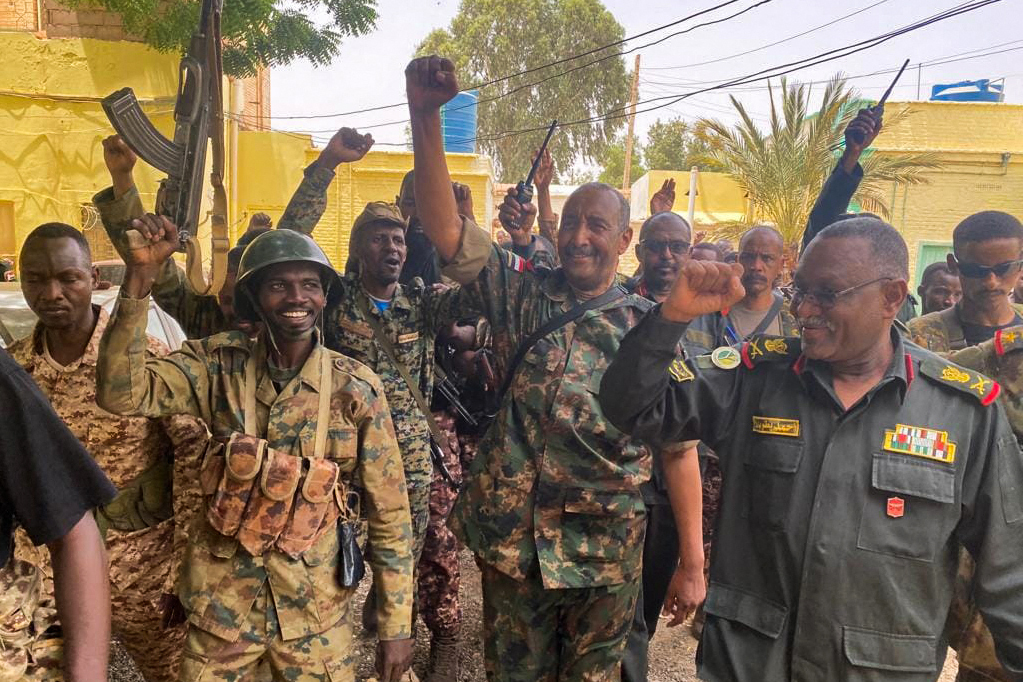A new 72-hour truce entered into force in Sudan on Sunday morning, on the eve of a conference to coordinate the humanitarian aid needed by about half of the country's population.
The army, led by Abdel Fattah al-Burhan, and the Rapid Support Forces, led by Muhammad Hamdan Dagalo, had previously concluded, most of the time with Saudi-American mediation, more than one truce since the outbreak of the conflict between them on April 15, but it was not fully adhered to on the ground.
However, the two sides have largely adhered to the recent 24-hour truce, which took place at the end of last week. Witnesses confirmed to AFP at the time that the truce provided a calm that they had not experienced since the start of the fighting, but that the battles resumed immediately after the end of the cease-fire agreement.
The new truce took effect at 6:00 local time (0400 GMT). An hour after it began, witnesses in Khartoum told AFP that the situation was still "calm".
And residents in the capital expressed their desire for the cease-fire agreements to be longer.
Hanaa Hussein, who lives in central Khartoum, said, "Our problem is that the days following the armistice are very harsh, as if the fighters want to compensate for the days of the armistice."
For his part, said Sami Omar, who lives in the suburb of Omdurman, north of the capital, "We want a comprehensive cease-fire."
He added, "The truce is not enough for us to return to life. They may stop fighting, but the Rapid Support Forces will not leave the houses (which its members have taken control of), just as passing through the checkpoints is difficult during the fighting days."
On Saturday night, Saudi Arabia and the United States announced "the agreement of representatives of the Sudanese Armed Forces and the Rapid Support Forces to cease fire in all parts of Sudan for a period of 72 hours, starting from June 18-21."
The statement confirmed that the two parties pledged that they would "refrain from movements, attacks, the use of warplanes, drones, artillery bombardment, reinforcement of positions, or resupply of forces," and they would allow "freedom of movement and the delivery of humanitarian aid throughout Sudan."
The army confirmed its approval of the armistice, but indicated that "we will deal with a decisive response to any violations committed by the rebels during its validity period."
The support forces affirmed their commitment to "what serves the purposes of the humanitarian truce, especially facilitating the delivery of aid (...) and opening safe passages for citizens."
Riyadh and Washington called on the two parties to the conflict to "consider the great suffering of the Sudanese people, and the need for full commitment to the ceasefire and the cessation of violence."
The declared truce coincides with a conference to coordinate the humanitarian response, which will start Monday in Geneva.
According to United Nations estimates, 25 million people, more than half of the estimated population of 45 million, need assistance in a country that was considered one of the poorest countries in the world even before the conflict.
The fighting caused a shortage of food and basic services. Medical sources confirm that three-quarters of the hospitals located in combat zones are out of service.
Saudi Arabia, which chairs the conference in partnership with other countries and parties, announced that the conference aims to "announce pledges to support the humanitarian response to Sudan and the region."
The United Nations indicated earlier this month that its humanitarian response plan had received only 16 percent of the required funding.
"Out of the total $2.6 billion needed for the humanitarian response this year, we have received only 400 million," said spokesman for the Secretary-General Stephane Dujarric.
The announcement of the new truce came on a day that witnessed an escalation in air and artillery bombardment of various areas in Khartoum, while violence in the Darfur region in the west of the country prompted an increasing number of people to flee to Chad.
The Resistance Committees, which are popular groups that have been active in providing support since the start of the conflict, reported that neighborhoods in southern Khartoum, including Mayo and Yarmouk, were bombed by the army on Saturday.
In a statement, it announced "the death of 17 civilian victims, including five children," and the injury of others, and "the destruction of 25 homes."
The Rapid Support Forces accused the army of attacking "a number of residential neighborhoods" in the south of the capital with air strikes, which led to "dozens killed and injured."
Witnesses in Khartoum confirmed to AFP on Saturday that the intensity of the aerial bombardment had increased in the past two days.
The conflict has killed more than 2,000 people, according to the latest figures from the Armed Conflict Location and Event Data Project (ACLED). However, the actual numbers may be much higher, according to relief agencies and international organizations.
Likewise, the battles caused the displacement of more than 2.2 million people, more than 528 thousand of whom sought refuge in neighboring countries, according to the International Organization for Migration.
More than 149,000 people crossed into Chad on the border with the Darfur region, where the situation is of growing concern, especially in El Geneina, the center of West Darfur state, one of the five states of the region.
Earlier this week, the United Nations warned that what the region is witnessing may amount to "crimes against humanity."








Share your opinion
A new truce enters into force in Sudan on the eve of an aid conference